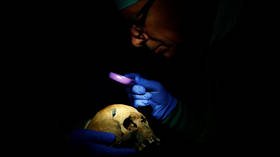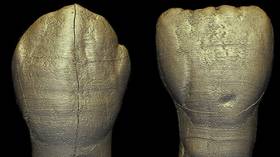Genetics firm gives law enforcement free run of profiles without users’ permission

At least one DNA testing company has given US law enforcement open access to its database of over a million users without their consent or knowledge, hoping it will help solve crimes. The implications for genetic privacy are dire.
Family Tree DNA has tested samples for the FBI and uploaded the profiles to its database on a case-by-case basis since last fall, the company admitted in a statement to BuzzFeed. The “new development” – which the company’s customers were never consulted about – “started with one case last year and morphed,” according to a company spokesperson.
While it has only cooperated with law enforcement on 10 cases so far, Family Tree appears to be quite proud of the relationship, boasting that founder Bennett Greenspan “had inadvertently created a platform that, nearly two decades later, would help law enforcement agencies solve violent crimes faster than ever.”
The DNA testing company quietly changed its terms of service last month to allow law enforcement to use the database in identifying victims’ remains and suspects of “a violent crime.” Most of the company’s million-plus users had already submitted their profiles by then, and neither they nor their family members – also searchable through the database – were informed or asked for their consent regarding the move.
Investigative genealogy has been heralded as the next frontier in detective work since a DNA match on public genealogy database GEDMatch led to the identification of Joseph DeAngelo as the Golden State Killer. But privacy advocates are concerned that the use of these databases sets a chilling precedent, especially as more people than ever are uploading their profiles.
Family Tree executives say the FBI has the same level of access as a normal customer – if agents want “additional information,” they need to provide a subpoena or search warrant, said Greenspan. The company was already served with a subpoena in 2017 for “limited information” on a profile related to the Golden State Killer, though that account was not linked to the criminal.
Before embarking on its special relationship with Family Tree, the FBI was limited to public DNA databases only – where users had uploaded their profiles knowing they would be searchable by anyone. Users unhappy about the new development can make their profiles private, but that defeats the purpose many use DNA databases for – finding distant relatives – by rendering them unsearchable.
Also on rt.com US attorneys say criminals may be roaming free as govt shutdown slows investigationsWhile a survey conducted last year by genealogist Maurice Gleeson suggested 85 percent of respondents were fine with their DNA being used to catch a serial killer or rapist, as the FBI’s genealogy unit travels the country teaching local police departments to use the new tools, the likelihood increases of such tools being used for casual surveillance or corrupt purposes.
The real victims, according to law professor Natalie Ram of the University of Baltimore, are the relatives of those who’ve uploaded their profiles to these databases, who never asked to be in the system in the first place and whose relationships are now in the hands of the national security state.
“We don’t choose our genetic relatives, and I cannot sever my genetic relation to them. There’s nothing voluntary about that,” Ram said. “We are nearing a de-facto national DNA database.”
If you like this story, share it with a friend!














